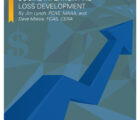Ethical Issues is written by members of the CAS Committee on Professionalism Education (COPE). The column’s intent is to stimulate discussion among CAS members. Therefore, positions are sometimes stated in such a way as to provoke reactions and thoughtful responses on the part of the reader. Responses are welcomed. The opinions expressed by readers and authors are for discussion purposes only and should not be used to prejudge the disposition of any actual case or to modify published professional standards as they may apply in real-life situations.
Natalie is a senior partner at Actuaries For Hire (AFH). Beau is a consulting actuary at AFH who spends most of his time performing reserve opinions. Natalie is an Associate of the Casualty Actuarial Society, and Beau is a Fellow.
AFH has been developing iClaims Turbo™, a complex claims-management system, for several years. The iClaims Turbo system helps insurers track claims from the time they receive notice through settlement. It uses predictive modeling to help insurers set case reserves based on claim characteristics and flag certain claims that may require particular attention. Extensive time and money has been spent developing iClaims Turbo, but sales have been slow, and Natalie is getting pressure to get more clients signed up for the system.
Extensive time and money has been spent developing iClaims Turbo, but sales have been slow, and Natalie is getting pressure to get more clients signed up for the system.
Beau is working on a reserve opinion for Skinflint Assurance Company (SAC). Natalie has been in discussion with SAC management about buying iClaims Turbo. Though SAC was initially hesitant to pay the high price for iClaims Turbo, Natalie believes they are close to signing.
Beau recently completed his analysis of SAC’s reserves, which shows that SAC’s held reserves are deficient by a relatively small, but material, amount. He sends his analysis to Natalie for review and includes a proposed recommendation to SAC that they increase their reserves.
Natalie schedules a meeting with Beau to discuss his reserve opinion. At the meeting, Natalie seems upset and frustrated. She begins by pointing out that SAC has had a strong reserve position for many years, and that she is in disbelief that their reserves would suddenly become deficient. Beau explains that, according to his analysis, the primary reason for the deficiency is adverse development on claims in older accident years. SAC writes a lot of general liability business and, in Beau’s opinion, has done a poor job of reserving for tail events. In the past year, SAC has seen considerable development on claims from over 20 years ago, but they have virtually no case reserves for these claims and little IBNR in those accident years.
Upon hearing Beau’s explanation, Natalie’s mood quickly improves. She begins listing all of the ways in which iClaims Turbo can help SAC. In particular, she argues that if SAC was using the system, it would have settled the large liability claims earlier and would not have had to deal with the current adverse tail development. Though Beau is not particularly familiar with the functionality of iClaims Turbo, he nods politely at Natalie’s suggestions.
Natalie says to Beau: “What we have here is the opportunity to do good! SAC is close to buying iClaims Turbo, and, if I explain to them that their prior year adverse development is due to poor claims management, they will probably close the deal. But we need to sign off on their current reserves before that happens. I’ve been meeting with SAC’s management for months trying to make this sale, and I know how those cheapskates think. If we tell them they have deficient reserves, they will back away from the sale, even though iClaims Turbo will save them money by helping them manage their claims process. Do you follow me?”
Beau cannot believe Natalie’s argument and thinks to himself, “Is she really asking me to sign off on deficient reserves?” He explains to Natalie that he is uncomfortable signing off on reserves that he believes are inadequate, but Natalie responds that doing so would be in SAC’s best interest because iClaims Turbo will help them solve their structural claims management problems. She further argues that, by informing SAC that their reserves are deficient, AFH will definitely lose the sale and potentially lose a client; however, by Beau signing off on the reserves, AFH can make a large sale and help a client. It’s a win-win!
Beau replies, “Look, I’m not going to risk my credentials by signing off on deficient reserves. And please stop acting like selling the iClaims Turbo is an act of altruism. You’re only concerned with the bonus you’ll get from this big sale.”
Natalie responds by saying that she is interested in making the sale, not just for her sake, but also for the entire office. “If sales don’t pick up soon,” she says, “my bosses will force me to cut costs. I don’t want to have to let anyone go and the best way to avoid that is to make this sale.”
What are Beau’s professional obligations? Among the alternatives, consider these options:
Option 1
Beau complies with Natalie’s request but feels he needs to review some of his assumptions. Since the reserve deficiency is a relatively small amount, he may be able to modify some of his assumptions so that the carried reserves make it into the bottom end of his range of reasonable estimates. With the new claims system, perhaps SAC will be more aware of its potential loss development issues. This will make Natalie happy and maybe even keep Beau from losing his job. Additionally, iClaims Turbo may well help SAC better manage claims and, over time, correct its deficient reserves.
Option 2
Beau should inform Natalie that he cannot sign off on deficient reserves under any circumstances. Beau turns to the CAS Code of Conduct for guidance, and several of the precepts seem applicable to the situation:
- Precept 1 — An Actuary shall act honestly, with integrity and competence, and in a manner to fulfill the profession’s responsibility to the public and to uphold the reputation of the actuarial profession.
- Precept 7 — An Actuary shall not knowingly perform Actuarial Services involving an actual or potential conflict of interest.
- Precept 8 — An Actuary who performs Actuarial Services shall take reasonable steps to ensure that such services are not used to mislead other parties.
It seems clear to Beau that Natalie has a conflict of interest and that she is trying to drag him into that conflict.
If Natalie does not back down on her insistence that Beau sign off on SAC’s reserves, then Beau should inform others at the company, such as Natalie’s boss or AFH’s legal department or both, that Natalie is asking him to violate his professional integrity. He can also inform Natalie that he will report her to the Actuarial Board for Counseling and Discipline unless she accepts that he will not sign off on deficient reserves.













